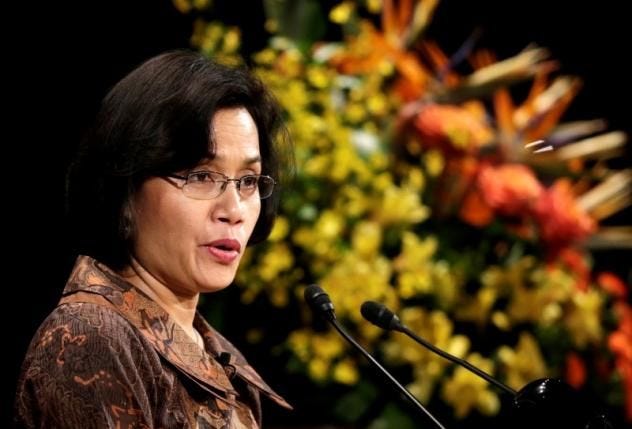Terror raids after Medan bomb | Central bank dodges rate cut | Indonesia Intelligencer (Nov. 10 - 22)
Hello Coconauts!
I’m Erin Cook, your new Indonesia Intelligencer writer. I produce the newsletter Dari Mulut ke Mulut which looks at all of Southeast Asia and I’m thrilled to join the Coconuts family to dig deeper into the stories shaping Indonesia.
We’re mixing things up here this week and trying out a new format. You’ll still get the business, politics and other must-know news you’re used to, but we’ll begin with what I like to call ‘The Lede.’ This is a story which has made the headlines, or will!, with the context you need to make conversation at the es kopi susu joint.
This week’s Indonesia Intelligencer is a freebie while we get adjusted, but please join us as a premium subscriber to keep up with all the developments in Indonesia.
Enjoy!
The Lede

Last week’s suicide bombing in Medan, North Sumatra, has brought the government’s promise to focus on security issues to the fore. The bomber, identified as a 24-year-old student, was initially suspected of being a lone wolf attacker but investigations have erupted across Sumatra in an effort to identify and root out the extent of the network.
A string of counter-terror raids since the bombing, which left the attacker dead and half a dozen injured, has netted around 45 suspects. Authorities say the Medan bomber was linked to terror network Jamaah Ansharut Daulah. Two suspects, who authorities say had built the bomb, were shot dead in a confrontation with police over the weekend.
Coordination between the National Police and the National Counterterrorism Agency (BNPT) is under scrutiny by the House of Representatives. Desmond J. Mahesa, deputy head of the House’s Law Commission, says detection and preventative measures had both failed. “What is the role of Densus 88 (police’s anti-terrorism squad) and BNPT? How come those incidents were not detected since the beginning. They said the case of Pak Wiranto had been monitored, why did it happen then?” Desmond said, referring to last month’s stabbing attack on former minister Wiranto.
Business

DANA stakes a claim to Blue Bird
E-wallet app DANA is making a strong play in the app wars announcing a deal with Blue Bird taxis this week. Riders who book a taxi through the Blue Bird app can now make payments via their DANA account. The start-up still sits behind GoPay and OVO, but is negotiating deals to expand its coverage to include commuter trains and an unidentified motorcycle taxi app.
Indonesia has been named as one of two key expanding markets in Southeast Asia. The 2019 Southeast Asia E-Money Market report released this week from S&P Global Market Intelligence shows 10 billion e-wallet transactions completed last year, with Indonesia accounting for around 20 percent.
Rate cuts on pause
Bank Indonesia held out on rate cut this week, marking a slowdown after four consecutive cuts. Instead, it has lowered reserve rates for banks in an effort to stimulate lending. Governor Perry Warjiyo said a two point cut will come into effect from January 2 as the central bank feels slightly more optimistic for the future. “We see that our economy is improving going forward and this should improve economic prospects and corporations’ confidence,” he said.
Ahead of the announcement, Finance Minister Sri Mulyani Indrawati indicated the government would raise its fiscal deficit target as part of a broader arsenal of policy to combat slowing growth and blowback from the US-China trade war.
Palm oil Avengers, assemble!
Indonesia has teamed up with palm oil-producers Malaysia, Brazil, Honduras, Nigeria, and Thailand to present a united front against international moves to curb production. Speaking at the Council of Palm Oil Producing Countries in Kuala Lumpur, Malaysian Prime Minister Mahathir Mohamad echoed recent promises from the Indonesian government to take the fight to the World Trade Organization. “If there is any evidence that such discriminatory trade practices are in violation of any international laws, Malaysia and other producing countries under the CPOPC must seek intervention from the WTO,” the host said.
Recommended reads
Why Indonesia needs to upgrade data infrastructure as digital services grow exponentially (SCMP)
Jakarta currently has 50.2MW data centre capacity with an incremental 70MW in the pipeline by 2021. The new data centres will apply best practice principles to be scalable, secure and efficient.
At least one campus will be energy self-sufficient to operate reliably, designed to have a lower impact on the natural environment, with high fault tolerance and high uptime availability. This will give customers who have established themselves in Jakarta more opportunities to expand quickly, knowing that there is available capacity at hand.
Gojek ups bid to enter Philippines in threat to Grab monopoly (Nikkei Asia Review)
In a sign that Gojek is gearing up for a more serious lobbying effort to obtain a license, the company advertised for a "head of government relations" in the Philippines on LinkedIn earlier this month.
On Monday, Philippine Competition Commission Chairman Arsenio Balisacan called for "more viable players" to "let real competition take place on the roads and in the market" after announcing a series violations committed by Grab.
Politics

Budget set to be short-changed
The national government is scrambling to plug a budget deficit which is expected to hit $20 billion. Revenue will likely fall short of targets, Bloomberg reports, landing at just 70 percent of what was expected. Finance Minister Sri Mulyani Indrawati pointed to stressors in the industrial sector which have been particularly hard-hit by global woes.
Governor Anies forces evictions
Jakarta Governor Anies Baswedan is accused of backpedalling on a major election promise after forced evictions in Sunter, North Jakarta, have left a community homeless. Sunter residents say that even if they were to be offered low-cost subsidized housing, it will be difficult to make a livelihood. Anies campaigned hard against predecessor Basuki ‘Ahok’ Tjahaja Purnama’s policy of forced evictions of makeshift homes along the city’s waterways. “We were Anies’ voters, why are we being evicted? He said there would be no eviction under his administration,” one resident complained to reporters.
PKS finds a friend
The Prosperous Justice Party (PKS) will not be lonely in opposition for much longer, with Tommy Suharto’s Berkarya Party forming an alliance. Berkarya failed to secure any seats in this year’s election, but has vowed to be "an alternative voice amid the consolidated political power." PKS chairman Sohibul Iman has swatted away criticisms over Tommy’s ability to remain relevant while outside of the House, saying: “as a political party it has the right to speak for and support the parties outside the government. That's what we need from the party.”
Recommended reads
Indonesian politician at heart of permit scandal dies ahead of graft trial (Mongabay)
His death came a month after he was charged with corruption for allegedly conspiring to inflate the budget for project to build a seaport in Seruyan’s Segintung Bay between 2007 and 2012. Investigators at Indonesia’s Corruption Eradication Commission (KPK) said the scheme resulted in 20.84 billion rupiah ($1.48 million) in losses to the state.
The KPK alleged that Darwan steered the contract for the project to developer PT Swa Karya Jaya, in exchange for the company backing his 2003 election bid.
The rise of 'kadrun' and 'Togog': Why political polarization in Indonesia is far from over (The Jakarta Post)
Political analyst Adi Prayitno from State Islamic University (UIN) Syarif Hidayatullah Jakarta said the emergence of new name-calling in digital political conversations only showed that political reconciliation was limited to the elites. The grassroots, he said, were still very much divided.
"At the grassroots level, the rift is real. Frankly, both Jokowi supporters and Prabowo supporters are disappointed by the fact that the two are now allies in the [government] coalition. It was as if their rivalry thus far was nothing but a momentary political commodity," he said.
Other news and notable features

Bali says no to ‘No’
US-based travel publication Fodor has offended Bali after placing the island on its list of ‘No’ destinations, that is, places not worth visiting. Fodor noted overtourism has negatively impacted the island’s reputation and led to waste issues and an influx of rude tourists. “I’m thinking positively, maybe it could be good for us to improve,” Bali Vice Governor Tjokorda Oka Artha Ardana Sukawati said in response.
He’s asked tourism operators to do their part — not by implementing sustainable practices, but by asking visitors to post positive snapshots to social media. “We ask for support from tourism practitioners to invite tourists, that while they are on vacation, to upload photos or videos on social media about Bali in a positive light,” he said.
Clerics head back to school
‘Left’ and ‘right’ wing clerics will be targeted by a new training program from the Indonesian Ulema Council (MUI). MUI head Muhammad Cholil Nafis says the program will ‘unite’ preaching as part of a wider initiative to stamp out radical sermonizing. “The preaching method we have approved is the method that strengthens Islamic faith as well as fostering unity in Indonesia,” Choli says.
Indonesians, Malaysian football fans spar
Duelling between Malaysian and Indonesian football fans are almost a spectator sport in themselves. A row between fans at the Kuala Lumpur-hosted second round of 2022 World Cup qualifiers, which saw Indonesia downed 2-0, erupted leaving 27 Malaysian fans and 14 Indonesian punters arrested. Fans threw firecrackers and traffic cones at each other before police quelled the storm. It follows a similar blow-out earlier this year in Jakarta.
Recommended reads
Jokowi’s curious plan for Indonesia’s capital (The Interpreter)
It’s also hard to see how moving the central government will help improve governance. The Indonesian system is already one of the most decentralised in the world, with 508 local governments receiving a minimum 26% of the central government’s net domestic revenues and a share of national resource revenues. It’s unclear how moving the locus of central bureaucratic activity will make government more responsive to the people.
Conversely, it is easy to imagine how governance might instead worsen. Forcing civil servants to leave Jakarta’s comforts for what is currently a forest will only make it harder to attract and retain the kind of capable public servants Indonesia needs in the face of stiff competition from the private sector.
The Chinese who fled Sukarno’s Indonesia to build a new Bali under Mao (SCMP)
Over the following six years, more than 100,000 ethnic Chinese – Tan and Wu among them – fled the country, returning to their ancestral homeland in ships paid for by the government in Beijing. When they arrived, they were sent to work on farm settlements that had been created specially for them, many of them in Fujian, Guangdong and Hainan provinces.
Among these settlements was Kampung Bali Nansan, which took in around 500 ethnic Chinese men and women, mostly penniless and exhausted.
Top Coconuts news



